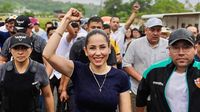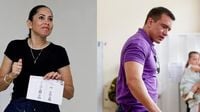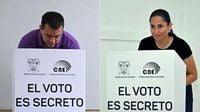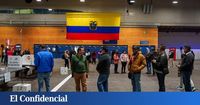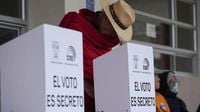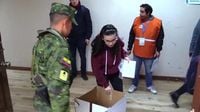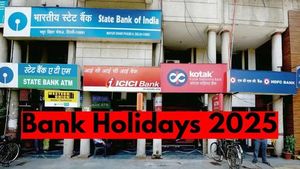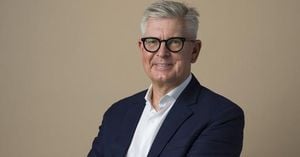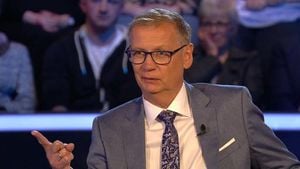On April 13, 2025, Ecuadorians are participating in a critical second round of presidential elections that pits current President Daniel Noboa against leftist candidate Luisa González. This election is seen as a pivotal moment for the nation, which has been grappling with unprecedented violence and political instability.
María José Pinto, Noboa's vice-presidential candidate, expressed optimism after voting in Quito, stating that the country seeks "equality" and emphasizing their commitment to justice and equality. She expressed gratitude for the support received from citizens during the campaign.
As of midday, the National Electoral Council (CNE) reported a participation rate of 41%, indicating an active response from voters. A total of 94,123 observers have been accredited from both Noboa's Acción Democrática Nacional (ADN) and González's Revolución Ciudadana (RC) movements. The elections are being closely monitored to ensure transparency.
However, the atmosphere surrounding the election has been tense. Diego Borja, the vice-presidential candidate for González, criticized Noboa's recent declaration of a state of emergency in seven provinces, labeling it "extremely serious" just before the elections. He argued that this move has generated significant distrust among international observers.
Gabriel Mato, head of the European Union's electoral observation mission, noted the "absolute normality" in the voting process, assuring that the elections commenced smoothly across the country. Despite this, heavy rains have forced the relocation of 24 voting centers, affecting ten provinces. Nonetheless, the CNE confirmed that voting continued without major incidents.
Luisa González, after casting her vote, asserted that she and her supporters are "ready to defend democracy." She called on security forces to refrain from intervening in the electoral process, urging them to ensure a fair counting of votes. González emphasized the importance of maintaining a neutral stance during the election.
In Brussels, approximately 2,000 Ecuadorians voted, expressing a collective desire to help steer their country away from its current trajectory of violence. Meanwhile, President Noboa voted amidst a strong military presence in Olón, Santa Elena, before retreating to his beach residence to await results.
González has been vocal about her concerns regarding potential electoral fraud, accusing Noboa of preparing to claim fraud if he loses. She stated, "We are prepared to defend democracy," reiterating her call for the armed forces to act impartially.
The Organization of American States (OAS) has also expressed concern over the state of emergency, urging guarantees for a transparent electoral process. Heraldo Muñoz, the OAS mission leader, emphasized the need for measures to ensure the exercise of electoral rights in areas affected by the emergency decree.
As part of the security measures, a "dry law" has been enforced from April 11 to April 14, prohibiting the sale and consumption of alcohol during the election period. Violators face significant fines, reflecting the government's commitment to maintaining order during this crucial time.
Amidst these developments, actor Mark Ruffalo suggested potential interference from former U.S. President Donald Trump in the Ecuadorian elections, stating that Trump's influence could skew the results in favor of Noboa.
José De la Gasca, Ecuador's Minister of Government, celebrated the commencement of voting, asserting that citizens can vote "without the shadow of mafias" that had previously threatened the electoral process. He reported that over 56,000 police officers and 45,000 military personnel have been deployed to secure the voting locations.
As the voting progresses, both candidates are aware of the close nature of the race. Noboa won the first round with a mere 44.16% of the votes, while González followed closely behind with 43.97%. The tight margins indicate that every vote will be crucial in determining the next president.
In Barcelona, Ecuadorians have also turned out in significant numbers to vote, with long lines reported at polling stations. The voting process in Spain is voluntary, contrasting with the mandatory voting requirement in Ecuador for citizens aged 18 and older.
The electoral process is being closely watched not only by local observers but also by international entities committed to ensuring a fair and democratic election. With nearly 14 million Ecuadorians eligible to vote, the outcome of this election will shape the country's trajectory for the next four years.
The election is not just a contest between candidates but also a reflection of the deep-seated issues facing Ecuador, including rampant violence, economic challenges, and the ongoing struggle for democracy. As voters head to the polls, the stakes could not be higher.
As the day unfolds, the world watches to see how Ecuadorians will respond to the challenges before them and whether they will choose to continue with Noboa's hardline approach or embrace González's vision for change.
